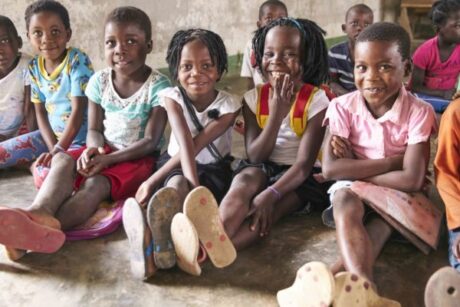Namupula, MozambiqueSitting on straw mat next to her mud brick home with a thatched roof, seven-year-old Angelca completes her homework as the sun sets for the evening.
After a long day of subsistence farming, Angelca’s parents, Eliza and Agostinho Armando, keenly scan their daughter’s written answers with a wooden pencil. This is a part of the family’s daily routine.
Even with weak literacy skills themselves, Angelca’s parents are better able to support their daughter’s education at home because she is learning in her local language of Emakhuwa, rather than Portuguese, the national language. Until recently, this would not have been the case as classes were taught in Portuguese, a language unfamiliar to most students and their families.
Eliza Armando, who is part of the small community of Namaita in Nampula province along with her family of five, is optimistic about her daughter’s future with this new local language instruction and has big dreams for her.
“My heart will be comfortable if my daughter manages to finish her studies, becomes employed and does well in life,” says Armando.
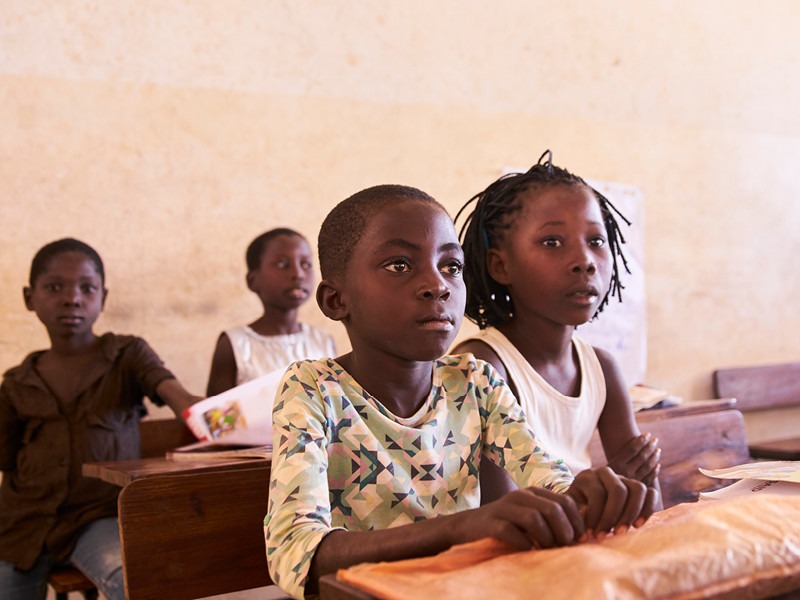
Bilingual education in Mozambique
Although the national language of the country is Portuguese—a legacy of the country’s colonial era before independence in 1975—this rural community in northeastern Mozambique primarily speaks one or more than 20 local languages.
The disconnect between the language spoken at home and the language of instruction (Portuguese) has resulted in low literacy rates and poor student performance. Poor curriculum design, lack of access to printed materials and teachers who do not have proper training also contribute to poor educational outcomes for children.
To close the literacy gap, the five-year Let’s Read! (Vamos Ler! in Portuguese) early grade literacy program is working closely with Mozambique’s Ministry of Education and Human Development (MINEDH) to improve reading and writing skills for more than 800,000 students in more than 2,800 schools.
During the first three years of primary education, students in the bilingual education program learn reading, writing and math skills in one of the selected local languages—Emakhuwa, Elomwe or Echuwabo— while developing oral Portuguese skills in preparation for the transition to full Portuguese instruction in the fourth grade.
The Let’s Read! program is funded by the U.S. Agency for International Development, and implemented by Creative Associates International, in close partnership with World Education, Inc., Overseas Strategic Consulting, American Institutes for Research and blueTreeGroup.
Partnering with parents
Ana Serafina, Angelca’s first grade teacher, has a vision of the future for the 30 students in her class: to succeed in a world without language barriers.
“When my students learn in both Emakhuwa and Portuguese, they will get benefits in school and in the community,” says Serafina, who has been a teacher at Naiculo Primary School for more than 10 years.
Serafina says that when Angelca first entered her classroom, she couldn’t read or identify individual letters. In a short amount of time, the Let’s Read teaching and learning methods widened her comprehension and now she can identify letters, mix them and form words to read sentences with confidence.
Serafina attributes the improvements in literacy at Naiculo Primary School to the adoption of effective, bilingual teaching approaches, revised curriculum, ongoing teacher development and more supportive and engaged parents.
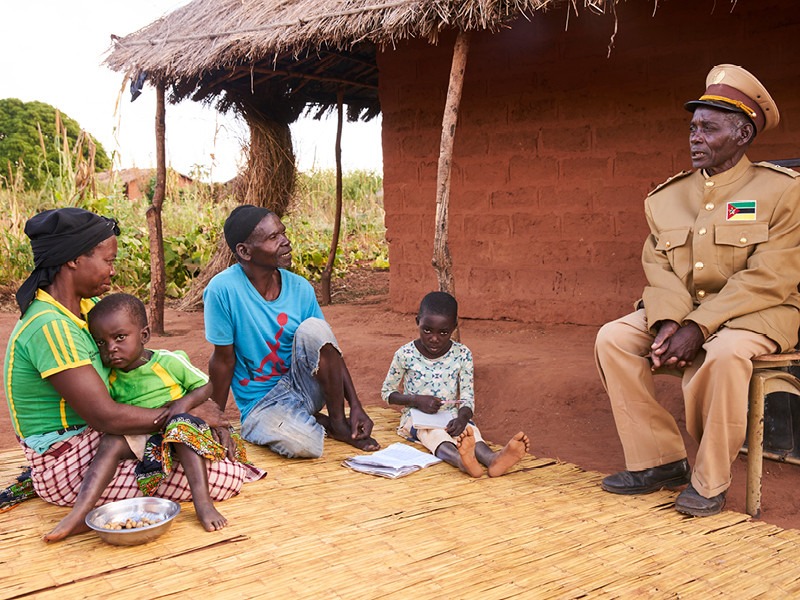
An advocate for bilingual education learning, Serafina says has observed how a classroom and home environment are equally important in improving literacy skills. She is encouraged to see parents like Angelca’s who are involved in their children’s educational journey.
“It’s obvious to see that Angelca’s parents care about her learning,” explains Serafina. “Her parents support her by giving her time to do homework. There are other children that just think of the homework when they are here in school.”
Among children who finish primary school in Mozambique, nearly two-thirds leave the education system without basic reading, writing and math skills. The early grade reading program is working to change this.
The Let’s Read! program is not only supporting bilingual curriculum development and professional development efforts, but also reaching out to the community to raise awareness of the importance of reading and the value of a bilingual education program that uses the local language to develop basic literacy and numeracy skills.
Equipping teachers, engaging students
In Ana Serafina’s classroom, colorful posters with hand-written Emakhuwa words and numbers adorn concrete walls. Her students energetically clap their hands and energetically sing the words of a letter-song in their local language while Angelca makes her way to the chalkboard to practice writing her name.
Serafina says she learned to leverage cultural storytelling to improve literacy skills through a recent professional development training.
“Some students tell a story and others teach the class a song they learned at home,” she says. “All of this is to give them support to learn to read, write and speak.”
The regular practice of these oral language skills is critical to a child’s development and learning.
As part of the Let’s Read! early grade reading program, educators like Serafina have been involved in a systematic series of structured teacher trainings and coaching on effective bilingual teaching methods. The trainings have been rolled out in close partnership and collaboration with the Ministry of Education.
“Step by step I am able to teach the children,” says Serafina. “Even those who come without knowing how to read any letter or word are now able to understand.”
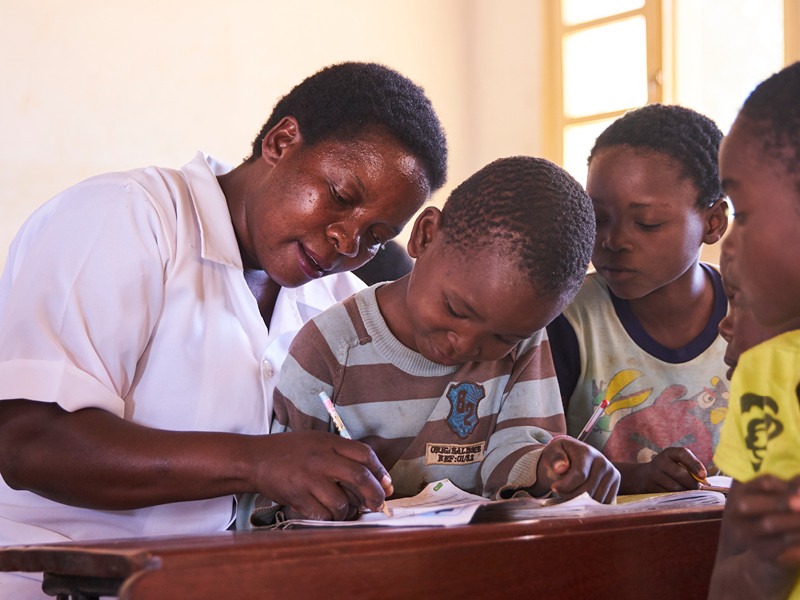
As a result of the 14-year civil war in Mozambique that ended in 1992, many teachers did not complete their education or have received poor training, which translated to ineffective teaching approaches and high teacher absenteeism.
Let’s Read! aims to equip teachers with the tools to motivate and inspire them to come to school and stay in the classroom and work toward improved literacy outcomes.
Along with the targeted teaching trainings, Let’s Read! is promoting a new coaching approach tailored to best practices in bilingual instructional approaches.
With sustainability in mind, the program is building a cadre of bilingual master trainers, as well as a school-based model of coaching, that will grow a bilingual education community of practice among early grade teachers.
To date, the program has trained more than 2,900 teachers, and more than 1,000 school managers and education administers in 906 schools, reaching more than 122,000 children in grade 1 alone in Nampula and Zambézia provinces.
Fostering literacy development with quality resources
For Samima Patel, Senior Reading Specialist for Let’s Read, teachers are at the heart of a successful reading program and supporting them with resources and training is essential.
“Unlike the other student books that have been developed in Mozambique, we have also completed manuals for the teacher to accompany the books,” says Patel, who has been a bilingual education activist for more than 25 years and has a background in linguistics.
She adds that along with qualified teachers, well-designed teaching and learning materials based on a blended phonics method can help jumpstart students reading in their own mother-tongue languages. This provides a base for them to hone their literacy skills and ultimately transition to Portuguese.
In Mozambique, Let’s Read has worked closely with government, universities, and language and reading experts to design, produce and disseminate early grade teaching and learning materials in the selected three mother-tongue languages.
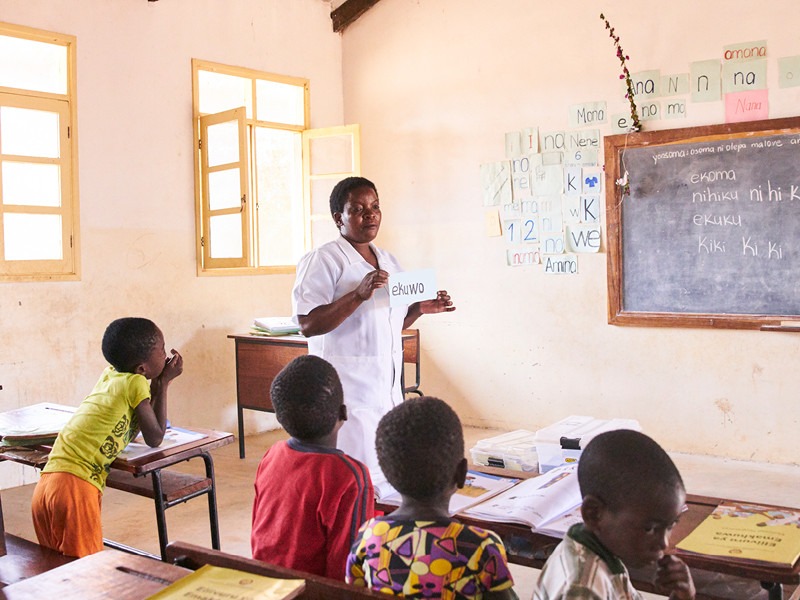
To date, more than 549,000 textbooks and other teaching and learning materials have been distributed.
The project has trained more than 4,000 teachers, school directors and Ministry staff in the new national bilingual education standards, so that they can continue to implement the program in years to come.
In a context where authorities once embraced the idea of assimilating to Portuguese, Patel says that the Ministry of Education, teachers and parents have quickly realized the value of students first learning to read in their local languages and embraced the program.
“Today, we cannot talk about bilingual education in Mozambique without talking about the Let’s Read Program,” she says.
A bright future for bilingual learners
As Angelca and her classmates progress in their learning of the Emakhuwa language, her teacher Ana Serafina is confident that they are building a foundation for the future success.
“When these students finish learning in both Emakhuwa and Portuguese, they will get benefits in school and in the community,” she says, referring to their ability to read, write, learn and lead in their local context and nationwide with their bilingual competency.
Even more learners will gain these literacy skills in the coming years as the program expands, ultimately reaching 800,000 students and 11,000 educators. In partnership with the Ministry of Education and Human Development, Vamos Ler also helped develop local language mathematics curriculum materials as well for grade 1 and 2.
For Senior Reading Specialist Samima Patel, the potential for these children, able to read, write and learn in both their local languages in Portuguese, is limitless.
“Reading is important for any child, for any human being because is through reading we learn many things,” she says. “Literacy brings the ability to read books and to see the world.”
With reporting by Leopoldino Jerónimo and Jillian Slutzker.

